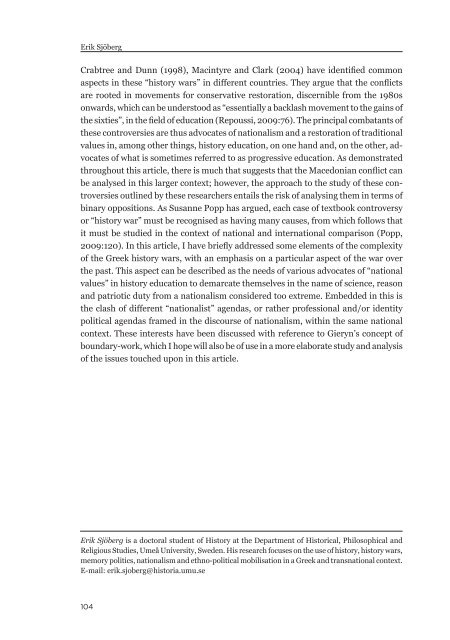Download issue - Umeå universitet
Download issue - Umeå universitet
Download issue - Umeå universitet
Create successful ePaper yourself
Turn your PDF publications into a flip-book with our unique Google optimized e-Paper software.
Erik Sjöberg<br />
Crabtree and Dunn (1998), Macintyre and Clark (2004) have identified common<br />
aspects in these “history wars” in different countries. They argue that the conflicts<br />
are rooted in movements for conservative restoration, discernible from the 1980s<br />
onwards, which can be understood as “essentially a backlash movement to the gains of<br />
the sixties”, in the field of education (Repoussi, 2009:76). The principal combatants of<br />
these controversies are thus advocates of nationalism and a restoration of traditional<br />
values in, among other things, history education, on one hand and, on the other, advocates<br />
of what is sometimes referred to as progressive education. As demonstrated<br />
throughout this article, there is much that suggests that the Macedonian conflict can<br />
be analysed in this larger context; however, the approach to the study of these controversies<br />
outlined by these researchers entails the risk of analysing them in terms of<br />
binary oppositions. As Susanne Popp has argued, each case of textbook controversy<br />
or “history war” must be recognised as having many causes, from which follows that<br />
it must be studied in the context of national and international comparison (Popp,<br />
2009:120). In this article, I have briefly addressed some elements of the complexity<br />
of the Greek history wars, with an emphasis on a particular aspect of the war over<br />
the past. This aspect can be described as the needs of various advocates of “national<br />
values” in history education to demarcate themselves in the name of science, reason<br />
and patriotic duty from a nationalism considered too extreme. Embedded in this is<br />
the clash of different “nationalist” agendas, or rather professional and/or identity<br />
political agendas framed in the discourse of nationalism, within the same national<br />
context. These interests have been discussed with reference to Gieryn’s concept of<br />
boundary-work, which I hope will also be of use in a more elaborate study and analysis<br />
of the <strong>issue</strong>s touched upon in this article.<br />
Erik Sjöberg is a doctoral student of History at the Department of Historical, Philosophical and<br />
Religious Studies, <strong>Umeå</strong> University, Sweden. His research focuses on the use of history, history wars,<br />
memory politics, nationalism and ethno-political mobilisation in a Greek and transnational context.<br />
E-mail: erik.sjoberg@historia.umu.se<br />
104

















